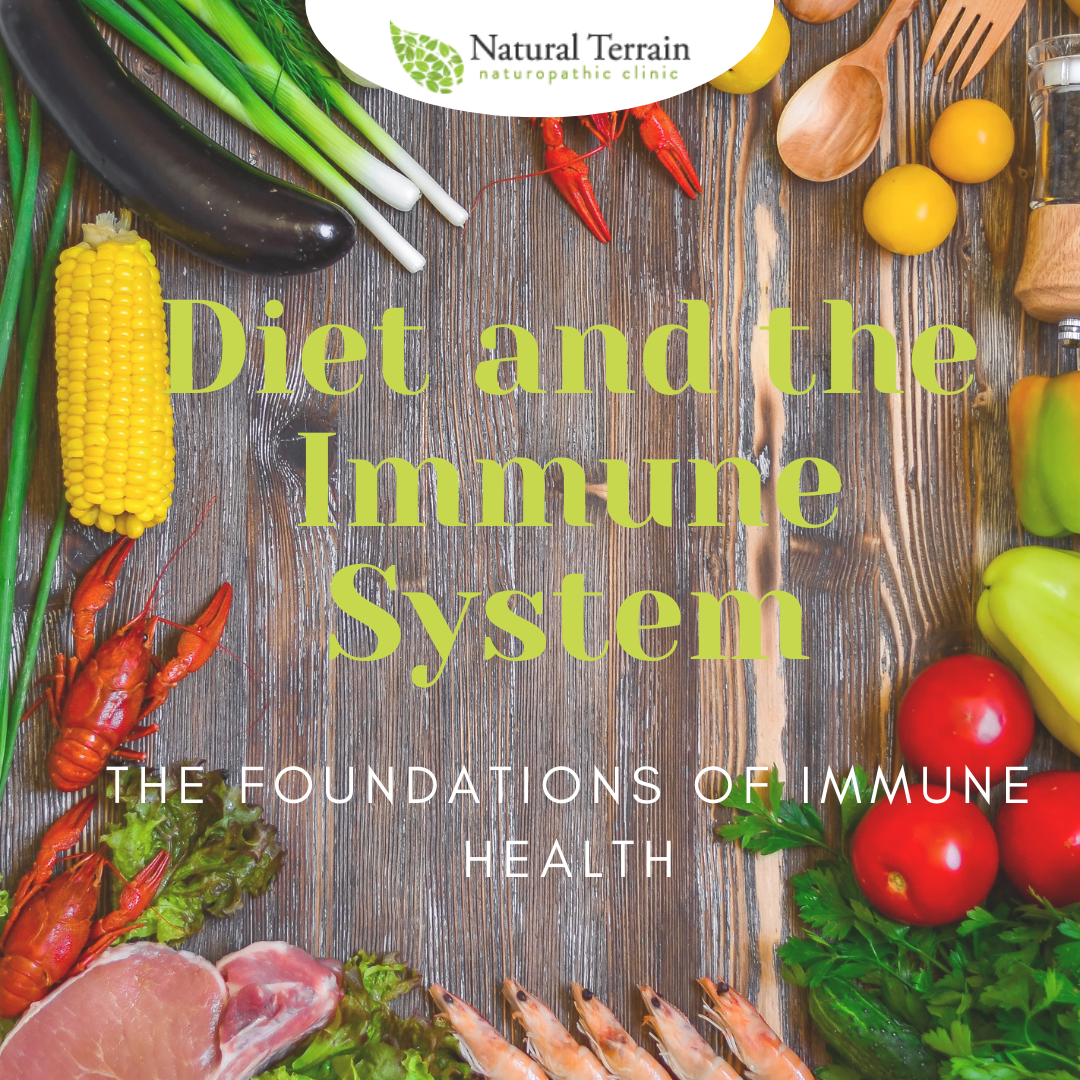The Foundations of Immune Health: Part 3- Diet

Optimizing the immune system requires more than taking a simple pill. It is an interplay between lifestyle and diet. The foundations of the immune health require special attention to different aspects of your life such as
-
-
-
-
-
- A good night’s sleep
- Stress management
- A healthy diet
- Exercise and time outdoors
- Appropriate supplementation
-
-
-
-
This week we will be discussing how diet plays a role in immune health and tips to make sure your diet supports your immune system.
The Connection Between Diet and the Immune System
Throughout the whole immune process, the body requires certain micronutrients to help fend off invading microbes. One of the best ways to get these micronutrients is through the diet. Food provides energy and nutrients to help our immune cells work effectively in prevention and recovery.
Diet also plays a major role in regulating the gut microbiome. The gut microbiome helps to breakdown and present the infectious agents to the immune cells in specialized tissue called the gut association lymphoid tissue (GALT). If we eat unhealthy food, we can experience something called “dysbiosis” which is an imbalance of our good microbiome bacteria and bad bacteria. The bad bacteria cause the body to go into an inflammatory state. When there are high amounts of inflammation in the gut we can develop something called leaky gut. This means that instead of food particles and bacteria entering the body in controlled ways and being checked by immune cells in the GALT, it now can enter your bloodstream unchecked. This can cause an immune reaction throughout the whole body and cause you to get sick.
Dietary Tips for Immune Health
You may be thinking “well then what should I eat?”. The answer is not as simple as you probably thought. The ideal diet should be individualized for every patient, their health concerns, values, beliefs and lifestyle. The best diets come from a partnership with our naturopathic doctors and their patients. Dietary changes should be reasonable and be able to be sustained for a long time.
In terms of immune health, here are our top dietary recommendations
1. Eat a variety of foods
The best way we like to explain this to patients is by telling them that they should “eat the rainbow”. Basically, this general rule suggests that when you look at your plate, you should see 4-5 different colours of food. Colours represent different nutrients that are in the foods. The immune system requires lots of different vitamins, minerals, proteins and fats to function optimally. The gut microbiome also thrives when exposed to a variety of different foods (see below for more suggestions on how to support your microbiome with food). Some other ideas include switching up your meals at least a couple of times a week, experimenting with cooking new foods and ensuring that all your meals have a protein, vegetables and a fat source, such as olive oil.
2. Eat your veggies and fruit
 Vegetables are dense in nutrients. They can help provide your body with different vitamins and minerals. Fruits and vegetables have antioxidant properties which help to reduce damage to our cells and optimize the immune system. Almost all vegetables and fruit have benefits to the immune system. Some examples of particularly great immune supporting fruits and vegetables are; berries, spinach, citrus fruits such as oranges, grapefruits, lemons and limes and cruciferous vegetables, such as broccoli, cauliflower, Brussel sprouts, cabbage and arugula.
Vegetables are dense in nutrients. They can help provide your body with different vitamins and minerals. Fruits and vegetables have antioxidant properties which help to reduce damage to our cells and optimize the immune system. Almost all vegetables and fruit have benefits to the immune system. Some examples of particularly great immune supporting fruits and vegetables are; berries, spinach, citrus fruits such as oranges, grapefruits, lemons and limes and cruciferous vegetables, such as broccoli, cauliflower, Brussel sprouts, cabbage and arugula.
3. Reduce inflammatory foods
During acute illness, inflammation is a good and natural process that helps the immune system fight off infections. However, if we are already in an inflammatory state when we get sick, then we are already using the immune system’s resources on other parts of the body that may not require as much energy. Inflammation leaves our bodies more susceptible to illnesses. The number one inflammatory food is SUGAR! It is also a good idea to avoid processed foods and excessive alcohol as they are also highly inflammatory.
4. Spice up your meals
 There are a lot of great spices out that don’t just add a bunch of flavour to your meals, but they also have immune-supporting effects. Garlic has a lot of antimicrobial properties that assists the immune system in preventing you from getting sick. Turmeric is highly anti-inflammatory and is a good antioxidant. Ginger is also good for bringing down the inflammation. These foods will help to improve your immune function. Try adding at least one to every meal.
There are a lot of great spices out that don’t just add a bunch of flavour to your meals, but they also have immune-supporting effects. Garlic has a lot of antimicrobial properties that assists the immune system in preventing you from getting sick. Turmeric is highly anti-inflammatory and is a good antioxidant. Ginger is also good for bringing down the inflammation. These foods will help to improve your immune function. Try adding at least one to every meal.
5. Eat probiotic rich foods
Because a lot of our immune cells are in our gut, it only makes sense that taking care of the gut is an important part of immune health. Probiotics help to populate the intestinal lining with bacteria that are helpful for nutrient absorption. Eat probiotics rich foods such as kefir, sauerkraut, kimchi and miso frequently.
To get more information and to individualize a diet for your health needs, book an appointment with a Naturopathic Doctor today!



